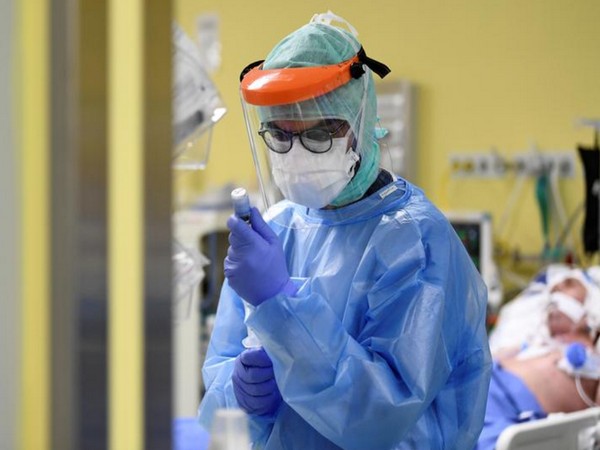Health News Roundup: S.Korea prime minister calls for calm as COVID cases hit new record; Very small blood clot risk after first AstraZeneca COVID shot - UK studies and more
Researchers have sought to analyse any link between COVID-19 vaccines and rare blood clots in the brain, arteries or veins - sometimes accompanied by low platelets, reports of which led many nations last year to pause use of the AstraZeneca shot, which was developed with Oxford University. CDC taps Palantir to support COVID-19 drug supply in U.S The Centers for Disease Control and Prevention (CDC) has awarded Palantir Technologies Inc a $5.3 million contract to manage distribution of COVID-19 drugs in the United States, the software maker said on Tuesday.

Following is a summary of current health news briefs.
S.Korea prime minister calls for calm as COVID cases hit new record
South Korea's prime minister on Wednesday called on people not to panic about a major increase in coronavirus infections as new daily cases surged past 170,000 for the first time. Serious cases and deaths are at manageable levels despite record cases caused by the highly infectious Omicron variant, Prime Minister Kim Boo-kyum told a pandemic response meeting.
Very small blood clot risk after first AstraZeneca COVID shot - UK studies
A large study into rare blood clots linked with AstraZeneca's COVID-19 vaccine found between just one and three cases per million, and only after the first dose, shedding fresh light on the side-effects from the shot. Researchers have sought to analyze any link between COVID-19 vaccines and rare blood clots in the brain, arteries, or veins - sometimes accompanied by low platelets, reports of which led many nations last year to pause the use of the AstraZeneca shot, which was developed with Oxford University.
CDC taps Palantir to support COVID-19 drug supply in U.S
The Centers for Disease Control and Prevention (CDC) has awarded Palantir Technologies Inc a $5.3 million contract to manage the distribution of COVID-19 drugs in the United States, the software maker said on Tuesday. The contract for supporting the distribution of therapeutics is for a duration of six months, Palantir said.
Chinese capital Beijing finds most daily local COVID cases in nearly a month
Beijing reported on Wednesday the highest number of daily local COVID-19 cases since late January, less than two weeks before the opening of China's annual parliamentary meeting in the capital on March 5. The city of Beijing detected 10 domestically transmitted COVID-19 cases with confirmed symptoms for Tuesday, data from the National Health Commission (NHC) showed on Wednesday. That marks the highest daily count for Beijing since Jan. 29.
S.Korea approves Pfizer COVID-19 vaccine for children aged 5-11
South Korea has approved Pfizer's COVID-19 vaccine for use with children aged 5-11, the country's food and drug ministry said on Wednesday. Children should get one-third of the regular dose, twice with a three-week interval, the ministry said in a statement. Children with significantly declined immunity can get a booster four weeks later.
Singapore's daily COVID-19 cases hit record of more than 26,000
Singapore's health ministry reported a record 26,032 COVID-19 infections on Tuesday and said it may take a few weeks before the current transmission wave peaks and subsides. "While the number of patients needing oxygen supplementation and intensive care unit (ICU) care is not high, there is a surge in demand for hospital beds, mostly for patients with underlying chronic illnesses to recover," the health ministry said in a statement on Tuesday evening.
Reinfections with Omicron subvariants are rare, Danish study finds
Getting infected twice with two different Omicron coronavirus subvariants is possible, but rarely happens, a Danish study has found. In Denmark, a more infectious sublineage of the Omicron coronavirus variant known as BA.2 has quickly dethroned the "original" BA.1 variant, which is the most common worldwide, but it has remained unclear whether a person could get infected by both variants.
Philippines detects bird flu in duck, quail farms
The Philippines' agriculture department said on Tuesday it had recently detected outbreaks of avian influenza in some duck and quail farms near the capital, after getting rid of the disease more than a year ago. The latest cases involved the H5N1 strain, not the H5N6 strain found during outbreaks in recent years, although both are classified as highly pathogenic.
Antibody triggered by Sinopharm COVID booster wanes after six months - study
Antibodies triggered by a third dose of Sinopharm's COVID-19 shot given to those who completed its primary two-dose regimen dropped sharply after six months, and a fourth shot did not significantly boost them against Omicron, a Chinese study showed. The study, published on Monday before peer-preview, said repeated immunization using inactivated vaccines such as the Sinopharm shot as a fourth booster may not be ideal to further increase antibody response against Omicron.
Baby formula makers still breaking global marketing rules - report
Almost all parents and pregnant women in China, Vietnam, and the UK are exposed to “aggressive” formula milk marketing campaigns that breach global rules set up after scandals more than 40 years ago, according to a new report. The marketing techniques can push women away from breastfeeding and include everything from giving free samples to executives setting up or joining "mums' groups" on popular messaging apps, the report from the World Health Organization (WHO), UNICEF, and M&C Saatchi said.
(With inputs from agencies.)
ALSO READ
Soccer-Player release issues threaten Japan and South Korea's Olympic hopes
UNICEF chief finally in Israel, meets with families of hostages
EMERGING MARKETS-Currencies rise as dollar retreats, South Korea's won advances
UNICEF urges to secure children's education in Nigeria on 10-year mark of Chibok abductions
ECHO to contribute USD 1M to UNICEF and WHO in response to cholera in Zambia










